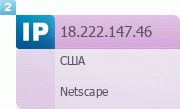When it comes to network security, much attention should be paid to all that relates to the anonymity of the Internet. In the minds of the average internet user there is the following opinion: «Why do I stumper anonymity? I'm not committed any illegal actions, let them worry about the hackers ... »But, let's think, how comfortable would you feel if every passerby on the street knew where you live. Some of them probably began to follow behind you and, of course, tried to penetrate your home. I think that this situation certainly will not be like. So why the problem of anonymity on the Internet give so little value? The answer is simple - it is user ignorance and illiteracy, as with any of it must be fought.
Knowing the IP address you can be on a lot, including your real location. So how can the same way to protect yourself?
First we will need to «hide», for this we will use a proxy server, which is a certain intermediary between the user and the computer servers on the Internet.
Main «rat» - this is your IP address, get rid of it is not possible, so it is necessary for routing data, but the proxy server sends requests and receives information as to himself. It seems that here it is a panacea, but not so simple in the fact that the vast majority of proxy servers at their request has been submitted in a special field (x-forwarded-for) IP-address end-user (there are so-called anonymous service, but their search - this is a very big problem).
The next version of the preservation of anonymity is to use proxy (anonymizer). In general proxy is nothing else like anonymous proxy servers, equipped with its own web-interface. They are very easy to use - you need to learn more about the proxy server and in a special field, enter the address you want your server --
In general, if not all, so you can be absolutely confident in his anonymity. However, the use of proxy has some drawbacks: it may significantly decrease the speed of loading pages, and the same is now almost impossible to find a free proxy server. It is noteworthy that recently a large number of people calling for the recognition of proxy illegal act, but this is nonsense, as well as banning the use of proxy urgent need to prohibit the wearing wigs or use the service say ANTI-AON, on a date, almost all cellular operator.
Now we know that there is a need to hide your IP address. Nevertheless, there are other, and somewhere even better «ways of monitoring» for users.
The most common, in my view, technology is cookies (eng. - cakes, biscuits). So what is it for the pies, which are also commonly called «cookies» - let's try to understand. Cookie - A string of characters up to 4 kb, which web-server stores in a special file on your computer. The technology was designed to make life easier for most users: for example, you often go to a forum on the Internet and communicate with people there, so that every time you open the main page of this forum if you do not have to undergo the procedure for authorization (to enter into special fields your username and password) you can simply put a tick in the box with names such as: «Remember me» or «Save password». And thus the server «save» to you and when you next come to the forum, you no longer have to enter their personal data. To preserve confidentiality, there is restriction: to extract information from «pechenek» Only the server to which it was recorded. Unfortunately this proved not to be circumvented simply, but very simple.
Let us remember that we can see at the bottom of almost any page in the Internet? Of these visits. Most of these items are loaded with their own servers, based on this conclusion: take the information from «kukov» can counter script visits (and thus the attacker can track your web-route to see sites you visit to understand the range of your hobbies) This is a real shadowing.
The next way to ensure the anonymity of the Internet, the most reliable at this point is to use socks-protocols (translated from English are also quite interesting, socks - socks). The principle of operation of something like the principle of operation of proxy servers and looks like this: socks-server receives the data from a computer owned by the user, sends them to the web-server, then sends feedback back to the user. But there are some fundamental differences between technology socks-servers and proxy servers. Most the cardinally difference is that "understanding" the client computer and the socks-server is not accepted, and special protocols (socks4, socks5, etc.). As a result of the transfer of IP-address of the user is impossible in principle. In addition, socks-server transforms itself from the user information in the requests for the generally accepted protocols. Thus, no server is never "no guess" that sends data is not the end user, but only mediator in the person of socks-server. By the same work with the technology of socks are very comfortable. Install the program, such as Socks-Cap, and run it, you have to choose only the software for which you wish to use anonymous connection (eg The Bat, or Internet Explorer), enter the address and port for socks server. And now you can go ahead and thinking about it.
Here, perhaps, are all more or less reliable means of ensuring the anonymity of the Internet today. Naturally, the situation is constantly changing, new design, so if you really want to remain unrecognized in travel over the Internet, try to keep the news from the field of computer security.
Wednesday, March 18, 2009
Subscribe to:
Post Comments (Atom)

No comments:
Post a Comment